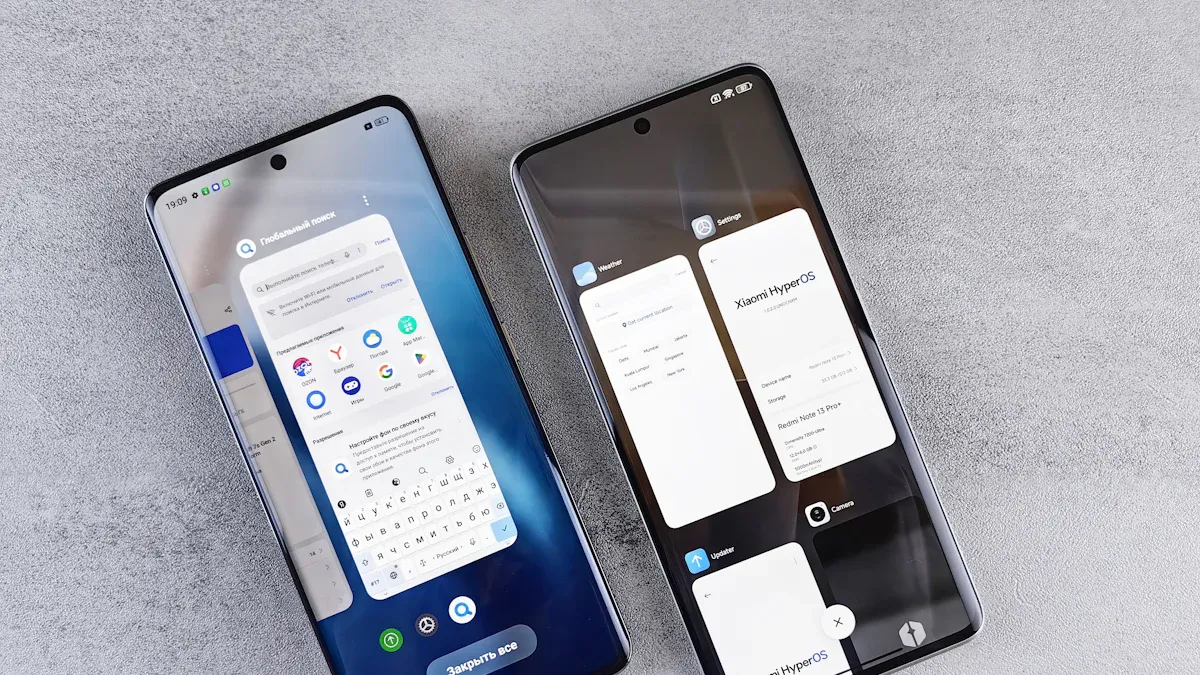
An android phone user agent works like your phone’s digital name tag when you go online. You use this user agent so websites know what phone you have. It helps websites show things that fit your screen. It also helps keep your data safe. Most people have an android phone, as you can see here:
|
Operating System |
Market Share (%) |
|---|---|
|
Android |
|
|
iOS |
30 |
User agent strings now only give simple details. This helps stop tracking and makes sure devices work together. You can make better choices about privacy and user agent spoofing. Modern phones like the VERTU Agent Q help you browse safely and protect your privacy with special features.
Key Takeaways
-
An Android phone user agent works like a digital ID for your phone. It helps websites show things that fit your screen size. User agent strings give websites details about your device. They tell the website your operating system and browser. This helps make your browsing better. You can change your user agent string by spoofing. This can protect your privacy or let you see different website versions. But you should use it carefully to avoid problems. Some browsers use user-agent reduction. This helps keep your personal information safe online. Devices like the VERTU Agent Q have strong privacy tools. They help keep your data safe while you browse easily.
Android phone user agent basics

What is a user agent string
When you go to a website on your android device, your browser sends a user-agent string. This string works like a digital ID card for your device. It tells the website what device you use, your operating system, and your browser. The user-agent string is in the http request header every time you visit a page. This helps websites know your device and show content that fits your screen.
A user-agent string from an android phone might look like this:
Example:
Mozilla/5.0 (Linux; Android 10; K) AppleWebKit/537.36 (KHTML, like Gecko) Chrome/98.0.0.0 Mobile Safari/537.36
You can see the string has details about the operating system, browser, and device. This information helps with device detection and web compatibility. The user-agent header lets servers know the application, operating system, vendor, and version of your device.
Here is a table that shows how user agent strings are different on each platform:
|
Platform |
User Agent String Example |
|---|---|
|
Android Phone |
Mozilla/5.0 (Linux; Android 4.0.4; Galaxy Nexus Build/IMM76B) AppleWebKit/535.19 (KHTML, like Gecko) Chrome/18.0.1025.133 Mobile Safari/535.19 |
|
iOS |
Mozilla/5.0 (iPhone; CPU iPhone OS 10_3 like Mac OS X) AppleWebKit/602.1.50 (KHTML, like Gecko) CriOS/56.0.2924.75 Mobile/14E5239e Safari/602.1 |
|
iOS Safari |
Mozilla/5.0 (iPhone; CPU iPhone OS 10_3 like Mac OS X) AppleWebKit/603.1.23 (KHTML, like Gecko) Version/10.0 Mobile/14E5239e Safari/602.1 |
You might notice that android user agents have the word “Android” and the device model. iOS strings show “iPhone” and the iOS version.
How android user agents work
Android user agents are important for how you use websites. When you open a browser or app, your device sends a user-agent string with every web request. This string helps websites know how to show content for your screen size and features.
The user-agent string has different parts. It usually lists the browser name, operating system, device model, and browser version. Here are some examples from popular android devices:
|
Device |
User Agent String |
|---|---|
|
Samsung Galaxy S22 5G |
Mozilla/5.0 (Linux; Android 13; SM-S901B) AppleWebKit/537.36 (KHTML, like Gecko) Chrome/112.0.0.0 Mobile Safari/537.36 |
|
Google Pixel 7 |
Mozilla/5.0 (Linux; Android 13; Pixel 7) AppleWebKit/537.36 (KHTML, like Gecko) Chrome/112.0.0.0 Mobile Safari/537.36 |
You do not have to set this string yourself. The android operating system makes it and sends it in the http request header. This started with early browsers like Mosaic in 1993. Over time, user agent strings got more complex to support many devices and browsers.
Today, user-agent reduction helps keep your privacy safe by sharing less information. Some browsers now use User-Agent Client Hints, which give similar data but with better privacy. If you want to change how websites see your device, you can use a custom user agent string. This is called user agent spoofing or ua spoofing. Spoofing lets you pretend to use a different device or browser. This can help with privacy or let you visit certain sites.
Tip:
If you have trouble with a website, you can try user agent spoofing. This might help the site work better with a different device profile.
Android phone user agent strings help you get the best browsing experience. They also help with analytics, security, and device compatibility. You should know how these strings work so you can make smart choices about privacy and user agent spoofing.
Why user-agent matters
Device identification
When you visit a website on your phone, you use a user-agent string. This string tells the website what device you have and your android version. With user-agent device detection, websites can show content that fits your screen and features.
-
Websites use user-agent strings and User-Agent Client Hints to know your device model and android version.
-
The http request header may have extra details like your device model or platform version.
-
JavaScript can get this information by using special APIs.
-
Some websites use Accept-CH or Critical-CH headers to ask for more details when you first visit.
Device detection helps websites work better for you. For example, if you use a VERTU Agent Q, the site can see your advanced device and show content for its special features. This also helps block fake traffic and ad fraud by making sure only real devices use certain services.
Note:
Starting with Chrome 110, android version and device model in user-agent strings are fixed. This makes identification easier and more private.
Web compatibility
User-agent strings help websites look good and work well on your device. When you use an android phone user agent, the website knows you are on a mobile device. The site then shows a mobile version with easy text and buttons.
User agent strings help websites:
-
Show smaller images and simple layouts for mobile users.
-
Display high-quality media and animations for desktop users.
-
Offer touch-friendly designs for tablets.
If your user-agent string does not match your real device or browser, you might see broken features or warnings. This is why user agent spoofing and ua spoofing can cause problems if not used right. Android user agents help websites send scripts and content that work with your device. User-agent reduction also helps protect your privacy by sharing less information.
Tip:
If a website does not look right, you can try a custom user agent string to fix it.
The VERTU Agent Q uses smart technology to give you the best browsing experience. Its good handling of user-agent strings means you see content that fits your device and stay safe from spoofing risks.
Analytics and SEO
User-agent strings are important for analytics and search engine optimization. When you visit a website, the site uses your user-agent string to track your device type. This helps website owners learn about their users and make their sites better.
-
User-agent strings help search engines like Googlebot find and index mobile websites.
-
They make sure mobile content is easy to find and use.
-
User-agent strings let websites personalize your experience so you return.
Knowing how user agent spoofing works can help you protect your privacy. It also helps website owners spot and block fake traffic. Ad fraud can happen when someone uses spoofing to pretend to be a real user. By checking user-agent strings, websites can stop this kind of fraud.
The VERTU Agent Q is a modern example. It uses smart user-agent handling to keep your data private and your browsing smooth. You get the benefits of advanced device detection and strong privacy protection.
Remember:
Good user-agent management helps both users and website owners. It keeps your browsing safe and makes sure you see the right content.
Privacy and security in android user agents

Privacy risks
Every time you use your android phone user agent, you share some information. The user-agent string in the http request header can show your device type, operating system, and browser. Websites use user-agent device detection to learn about your device. This helps block fake traffic and spot your device, but it can also put your data at risk.
Websites and apps can track you by using your user-agent string with other details. They collect things like OS version, browser type, and language settings. Some sites use JavaScript to get hardware info and how you use your device. They mix these details to make a special fingerprint for your device. This fingerprint can follow you online, even if you delete cookies.
Note:
User-agent reduction helps keep your privacy safe by sharing less information with websites.
User agent spoofing
User agent spoofing lets you change the user-agent string your browser sends. You might use ua spoofing to test websites, protect your privacy, or see blocked content. On android devices, you can do this in browser settings, with extensions, or with special apps. Tools like GeeLark help you make user-agent strings that look real and match android devices.
Spoofing can help you avoid tracking, but it has some risks. Some people use spoofing for ad fraud or to get around geo-blocks. Others use it for web scraping or to get free trials. Spoofing can make fake traffic and mess up analytics. It can even let desktop users act like they are on mobile devices.
Tip:
Always use user agent spoofing the right way to avoid security problems.
Best practices
You can keep your privacy safe by following these steps:
-
Use browsers that support user-agent reduction.
-
Do not share too much device information.
-
Change your user-agent string only when you need to.
-
Be careful with sites that ask for extra details.
-
Pick devices with strong privacy features.
The VERTU Agent Q gives you strong privacy and security. It uses Edge Autonomy to keep your data safe, even when you are offline. The device handles user-agent strings in a smart way, so you are protected from tracking and spoofing. You stay in control of your information and have a safe browsing experience.
Callout:
Devices like the VERTU Agent Q help you stay safe by mixing luxury, new ideas, and strong privacy protection.
Practical impact of user agent string
Browsing experience
When you use your phone to go online, the android phone user agent helps a lot. The user-agent string tells websites about your device and browser. This lets websites change their content for your screen size and power. You see pages that load quickly and look good on your phone.
-
Websites use the user-agent string to show layouts that fit your phone.
-
Developers can add features that work well with your device.
-
You get a smoother experience because the site knows what your phone can handle.
The VERTU Agent Q uses smart user-agent handling. You get browsing that is fast, private, and made for you.
App usage
Apps often use webviews to show web pages. The user-agent string in these webviews helps find out what device you have. This means apps can give you content that matches your device.
-
Web analytics tools can spot which app or webview you use.
-
App authors see how users interact with their apps.
-
Advertisers can send you content that fits your device and interests.
With android, user-agent reduction helps keep your privacy safe and lets apps work well. The VERTU Agent Q keeps your data safe, even when you use apps with webviews.
Troubleshooting
Sometimes, problems happen if the user-agent string is wrong or old. You might see websites that do not work right or apps that miss features. Services may block you if they think your user-agent string is fake.
|
Challenge |
Description |
|---|---|
|
Device model detection degradation |
|
|
Unknown platform version |
Analytics may not know your platform version. |
|
Decreased detection accuracy |
Device detection accuracy drops unless developers adapt. |
If you have trouble, check your user-agent string in the http request header. Spoofing can sometimes help, but it can also cause more problems. Devices like the VERTU Agent Q use smart device detection and strong privacy tools to keep your experience smooth and safe.
Knowing about the user-agent on your android device helps you stay safe online. It can help you keep your information private. It also makes your browsing better and more secure. You can do a few things to help:
-
Use User-Agent Client Hints to share less data.
-
Make sure your user-agent string matches your apps.
-
Pick devices that care about privacy, like the VERTU Agent Q.
If you learn about user-agent updates, you can browse faster and safer.
FAQ
What is a user agent on my Android phone?
A user agent is a small piece of information your phone sends to websites. It tells the site what device and browser you use. This helps the website show content that fits your screen.
Can I change my user agent string?
Yes, you can change your user agent string. Some browsers let you do this in their settings. You can also use special apps or browser extensions. Changing it may help you access different versions of websites.
Why do websites need my user agent?
Websites need your user agent to know what device you use. This helps them show pages that work well on your phone. It also helps them keep track of how users visit their site.
Does my user agent affect my privacy?
Your user agent can share details about your device. Some websites use this to track you. You can protect your privacy by using browsers that limit the information shared or by choosing privacy-focused devices.








